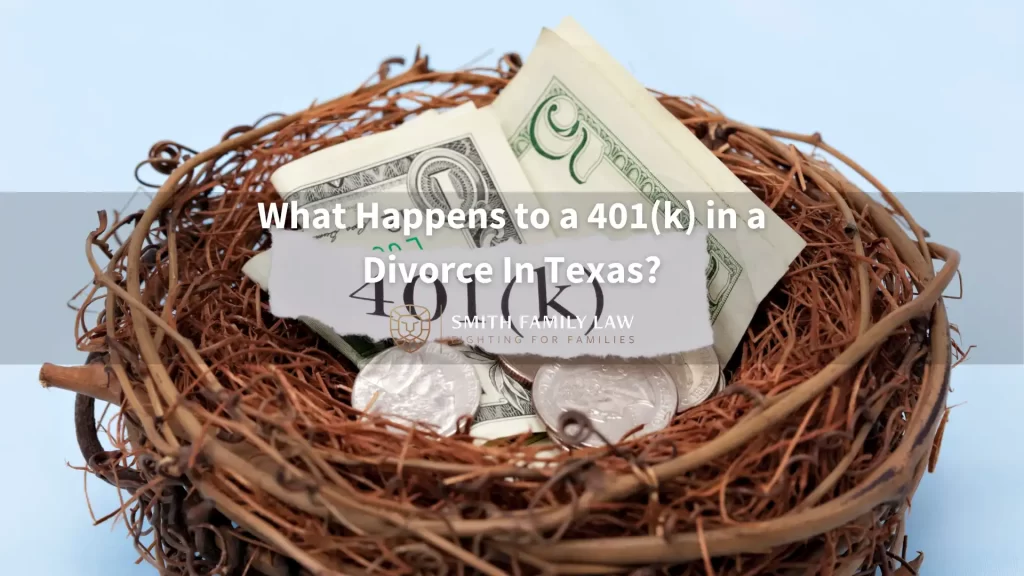
You’re usually eligible to receive half of the marital property you share with your spouse when you divorce in Austin, Texas. This may include retirement accounts like a 401(k).
However, dividing retirement accounts isn’t always as simple as splitting them down the middle. Factors such as when the account owner made contributions can impact spousal 401(k) rights.
Is a 401(k) Community Property in Texas?
Texas is a community property state. It’s also an equitable distribution state.
Under the Texas Family Code, community property (or marital property) is property that a couple has acquired after getting married. Details such as whose name is on a contract or who paid for property don’t matter. Once a couple gets married, any property they acquire is community property, except in specific circumstances.
Community property is subject to division in a divorce. Contributions to a 401(k) account qualify as community property. Even if a spouse isn’t the account owner, they are eligible to share in their spouse’s retirement savings.
Any gains made in a retirement account are also subject to division. If an account has appreciated, the court will account for this when dividing marital assets.
Is a 401(k) Ever Not Community Property in Texas?
A spouse may have contributed to their retirement accounts before getting married. In Texas, only contributions made to a 401(k) after a couple gets married are community property.
The contributions someone made to their 401(k) before getting married count as separate property. They are not subject to division in a divorce.
It’s very important to thoroughly review the contributions someone made to a retirement plan before and after getting married. Understanding what contributions do and don’t count as community property is key to dividing a 401(k) fairly.
How to Split 401(k) in Divorce in Texas
According to Section 3.007 of the Texas Family Code, it’s necessary to “trace” an account to determine what portion of the contributions are community property. This can be a complex process. Often, it’s necessary to enlist the help of forensic accountants or other such professionals in these circumstances. They can determine what portion of a retirement account is subject to division.
Hiring a forensic accountant might not be necessary if you and your spouse can come to an agreement regarding how to split a 401(k). That said, it’s important not to let anyone violate your rights. Don’t agree to a 401(k) divorce split until you’ve had time to discuss the situation with a family law attorney.
401(k) and Divorce in Texas: Important Information About Qualified Domestic Relations Orders (QDRO)
Spouses may come to an agreement on the division of a 401(k) in a divorce, or the court may make a decision on this issue for them if they can’t agree on it.
Regardless, the court must enter a Qualified Domestic Relations Order when splitting a 401(k). A QDRO is an order compelling the plan administrator of a 401(k) to provide a spouse with their share of the account.
A spouse may have the option to receive their share of a 401(k) in several ways. For example, they may choose to receive a lump sum payment. Periodic payments might be an option.
Do You Have to Pay Taxes on a 401(k) Divorce Settlement?
A spouse who receives a share of a 401(k) account after a divorce in Texas also receives a share of the tax obligation. They may pay taxes on the funds in the account when they redeem their share.
They must also be aware of the additional taxes they may pay on a 401(k) account if they make an early withdrawal. According to the IRS, the age at which one can begin making withdrawals from a 401(k) account is 59 ½ years. Making a withdrawal before reaching this age will trigger a ten percent early withdrawal penalty in addition to taxes owed on the withdrawn money.
How Long Do You Have to Be Married to Get Half of Retirement in Texas?
The length of a marriage typically doesn’t affect your ability to share in your spouse’s 401(k) after a divorce in Texas. A 401(k) is subject to division regardless of the marriage’s length. The primary factor will be whether there was any contribution or gain in the 401(k) account within the duration of the marriage. If not, the 401(k) will likely not be subject to division, as it will be the separate property of the account’s owner.
Are There Options Other Than Dividing a 401(k) in Texas?

For various reasons, the account holder might prefer not to split the 401(k). Or the other spouse may not wish to receive their share. Matters like paying taxes on the account and other such complications are reasons someone might feel this way. If they’re not the account holder, they might not care to acquaint themselves with the financial nuances of managing the funds.
They could request a greater share of another asset in exchange for their share of a 401(k). The account holder may offer another piece of property equal to the value of the 401(k) share their spouse would receive.
Whether spouses can reach such an arrangement depends on several factors. First, laws regarding property division still apply. In addition, spouses need to be confident the property they’re substituting for a 401(k) account has the same general value. A lawyer can assist you in working toward such an agreement.
Contact an Austin, Texas, Divorce Attorney
Understanding your rights to your spouse’s 401(k) in a Texas divorce can be tricky. When getting a divorce, you need representation from a professional who’ll help you secure the assets you deserve.
At Smith & Bledsoe Family Law, an Austin, TX, divorce lawyer can help you with this issue and various other divorce and retirement matters. Find out more about how our team of attorneys can help by contacting us online today or calling us at (512) 277-3166 for a free case review.
Related Reading: